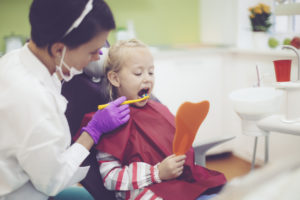
We are here today to talk about the importance of establishing a positive relationship between your child and their dentist at an early age. According to the American Academy of Pediatric Dentistry, the recommended age that a child should first see a dentist is before their first birthday. We like to recommend that our patients bring their children to the dentist when their first tooth comes in or by their first birthday—whichever comes first. At Ponte Vedra Complete Dentistry, we are committed to our patients and want them to feel as comfortable as possible, no matter how young they are. We are also dedicated to educating our patients on some of the most important topics related to the field of dentistry. One way that we continually educate our patients is with our blog. Today, we are going to answer some frequently asked questions about children’s oral health and also provide some tips on supporting your child during their dental appointments. We hope that you find this blog entry useful and informative. If you still have unanswered questions, however, please feel free to contact us at any time electronically or call (904)285-7711.
How Do I Teach My Children About Brushing Their Teeth?
It is important to brush a child’s teeth twice per day. Before your child gets his or her first tooth, make sure you wipe their gums off twice per day with a soft infant toothbrush or a wet washcloth. When your child is between the ages of 3-6, it is important to brush for them using only a small amount (smear or size of grain of rice) of toothpaste. Your child’s teeth should be brushed for 2 minutes twice per day. A fun way to assure that your child is brushing for the entire two minutes is by playing their favorite song or having them hum their favorite song while they are brushing.
When Should I Begin Flossing My Child’s Teeth?
You should begin brushing your child’s teeth once the teeth start to touch each other or the contacts between them close. You should floss between each contact and instruct your child in the proper way to do this. It may also be helpful for your child to watch you flossing your own teeth. Children are not effective at flossing on their own until they are 8-10 years old. There are some techniques that may make flossing easier for your child. You can buy flossing sticks that are single-use, disposable sticks with large handles that are easier for children to manipulate. You may also tie the floss around your child’s fingers to that they can handle it more easily.
How Often Should My Child Visit The Dentist?
Starting from the time that your child’s first tooth comes in, your child should visit the dentist every 6 months for a professional cleaning and a dental exam. This is not only important for your child’s oral health, but also important in establishing trust in the dentist and comfort in the dental office from a young age.
Should I Teach My Child About Cavities?
It is important for children to know what causes cavities and how they can be prevented. An easy way for children to grasp this concept is by talking to them about “sugar bugs”. You can tell them that sugar bugs live in your mouth and they like to eat away at their teeth. The best way for kids to keep sugar bugs from eating their teeth and causing cavities is by scrubbing them off twice per day with brushing and flossing. Another way to keep sugar bugs away is by not feeding them their favorite food—sugar—which is found in candies, cookies, juices, and sodas.
Does My Child Need Sealants?
Dental sealants are made out of the same material that tooth-colored fillings are. Sealants are placed in a child’s teeth to prevent the future development of cavities. Many cavities form in the deep grooves and pits that exist on the biting surface of teeth. Sealants work by “sealing out” these areas so that they cannot become colonized by bacteria and develop into cavities. Sealants are placed quickly and painlessly and can prevent the development of future dental problems. It is important for you to speak to your dentist about dental sealants if you think that your child may need them.
My Child Is Terrified of the Dentist—What Can I Do?
Recent research has indicated that the number one reason that a child may be scared of the dentist is because their mother or father is scared of the dentist. If you are scared of the dentist, it is important to break that familial cycle while your children are young. It may be better for your child to be taken to their dental appointments by another family member, such as a grandparent or aunt or uncle, so that these fears are not passed along. Your dental professionals are highly trained and have extensive experience treating children of all ages. It is important that you cooperate with your dental team so that they can most effectively treat your child. If you child is still scared of the dentist after open and age-appropriate communication, nitrous oxide or sedation may be a good option for easier visits.
With the support of their parents, siblings, and family dentist, most children learn to enjoy going to the dentist. It is important for children to feel comfortable with the dental office and learn by example from family members and friends. If you still have any questions or would like to schedule a consultation, feel free to contact us at any time electronically or call (904)285-7711



